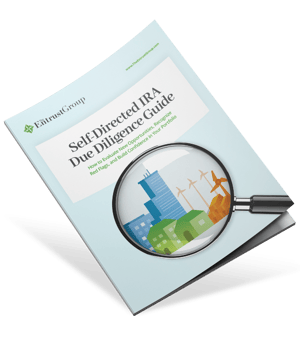90 Self-Directed IRA Investment Options

Estimated reading time: 4 minutes
One of the great advantages of a self-directed IRA (SDIRA) is the freedom to invest in assets that align with your interests, values, and unique expertise. An SDIRA gives you the opportunity to build a truly diversified portfolio and take advantage of alternative investments.
Many IRA custodians only provide access to traditional investments like stocks, bonds, and mutual funds. These assets can certainly provide valuable passive income but they represent only a fraction of what your IRA is capable of.
With a self-directed IRA, investment options are virtually boundless, from thriving real estate markets to burgeoning startups to precious metals. To give you an idea of exactly what’s possible with an SDIRA, here’s our list of 90 self-directed IRA investment options.
|
Start-ups |
||
|
Silver |
Palladium |
|
|
Shopping malls |
Supermarkets |
Vineyards |
|
Unsecured notes |
Limited partnerships |
|
|
Venture capital |
||
|
Undeveloped land |
Parking Garages |
Hotels |
|
Livestock |
Crowdfunding |
|
|
Manufacturing plants |
Mobile home parks |
Farms |
|
Theaters |
Band rehearsal studios |
|
|
Arcades |
Restaurants |
Fashion lines |
|
Cruise lines |
Town homes |
|
|
Apartment complexes |
Hospitals |
Warehouses |
|
Land trusts |
Land contracts |
|
|
Recreational facilities |
Airport runways |
Marinas |
|
Shipping yards |
Equipment financing |
|
|
Equity participation loans |
Billboard signage |
Construction loans |
|
Water rights |
Show horses |
Movie productions |
|
Food trucks |
Structured settlements |
FOREX |
|
Futures |
Equipment leasing |
Factoring investments |
|
Accounts receivable |
Duplexes |
HUD homes |
|
Bonds |
Car dealerships |
Royalty interests |
|
Record labels |
Amusement parks |
Sports stadiums |
|
Orchards |
Apiaries |
Green energy |
|
Platinum |
Secured notes |
Joint ventures |
|
Developed land |
Retirement homes |
Hedge funds |
|
Offshore real estate |
Micro loans |
Canneries |
|
Vacation Rentals |
Shipping centers |
Wind farms |
|
Airplane hangars |
Corporate debt |
Mineral rights |
|
Art galleries |
Bowling alleys |
Annuities |
|
Stocks |
Assisted living facilities |
Concert halls |
What Account Types Are Available With an SDIRA?
You can self-direct nearly all types of retirement accounts. This includes Health Savings Accounts (HSAs), Individual 401(k)s, and Education Savings Accounts (ESAs).
That said, two of the most popular options for establishing self-direction are the two main types of IRA: the traditional IRA and the Roth IRA. Each strategy offers access to tax-advantaged alternative assets, but there are key differences between the two.
- Traditional SDIRA: With a traditional SDIRA, contributions may be tax-deductible, and earnings grow tax-deferred until the funds are withdrawn. Withdrawals are subject to income tax and may be subject to a 10% penalty if taken before age 59½. Traditional SDIRAs also require the account owner to begin taking required minimum distributions (RMDs) at age 73.
- Roth SDIRA: With a Roth SDIRA, contributions are made with after-tax dollars. So, the account holder may always withdraw their original contributions. Earnings grow tax-deferred and may eventually be distributed tax-free, provided the holder meets certain qualifications.
- It’s been five years since the account holder first contributed to any Roth IRA, and
- The holder is either
- 59½ or older
- Deceased
- Disabled
- Withdrawing up to $10,000 to fund a first-time home purchase
Unlike a traditional SDIRA, a Roth SDIRA does not require RMDs during the account owner’s lifetime.
Interested in opening an SDIRA but aren’t sure how to fund it? Check out our Transfers vs Rollovers blog post or download our Funding Guide.
It's important to note that while self-directed IRAs offer a wide range of investment options, there are rules and restrictions governing these accounts. Many investors work with a financial advisor who specializes in SDIRAs to ensure that they remain in compliance with IRS regulations and avoid prohibited transactions.
What is a Prohibited Transaction?
A prohibited transaction is any improper use of your IRA by you, the IRA beneficiary, or a disqualified person. Certain transactions are prohibited to prevent individuals from using their IRA for personal gain.
Here are some examples of prohibited transactions:
- Self-dealing: This refers to transactions in which an IRA owner uses their IRA to benefit themselves directly or indirectly. They cannot engage with their IRA for any sale, exchange, extension of credit, or perform services with their IRA and any asset they have in their IRA. For example, an IRA owner cannot use their IRA to invest in real estate that they will live in or rent to themselves.
- Disqualified persons: Certain individuals are considered disqualified persons, and transactions with them are prohibited. Disqualified persons include the IRA owner's family members and fiduciaries. Transactions with disqualified persons are prohibited to prevent conflicts of interest and to ensure that the IRA is used solely for the benefit of the IRA and not the account owner directly.
- Prohibited investments: Certain types of investments are not allowed in an IRA, including life insurance, S-corps, and collectibles. These types of investments are prohibited by law and the tax code since issues such as valuation or shareholder restrictions prohibit an IRA from being an investor.

Explore Your Self-Directed IRA Options
As you’re exploring your SDIRA investment options, it's essential to conduct comprehensive due diligence. With so many opportunities available and risks to mitigate, knowing the right questions to ask is half the battle.
Download our Self-Directed IRA Due Diligence Guide to learn some crucial strategies to identify red flags in any investment you might come across. That way, you can invest with confidence and safeguard your portfolio from unnecessary risk.

Self-Directed IRA Due Diligence Guide
Now that you’ve learned all about what’s possible with self-direction, schedule a chat with one of our SDIRA experts.
Or, if you want to learn more in-depth information about real estate, private equity, and precious metals assets, watch our recent webinar, Expanding Your IRA Investment Strategy With An Expert Roundtable. In this discussion, three industry experts joined us to discuss emerging investment technologies, risk mitigation strategies, and more.
Note: All investments entail risk. Entrust does not promote any assets or provide any investment advice. Entrust provides the administration, information, and tools to make self-direction straightforward and compliant. Due diligence is the sole responsibility of the investor.






























3 Comments